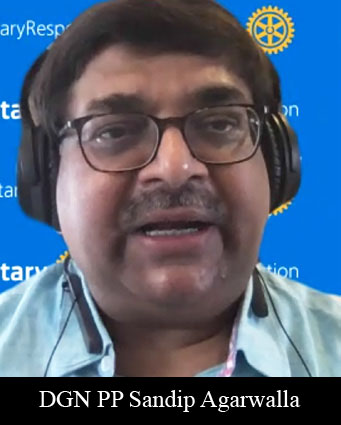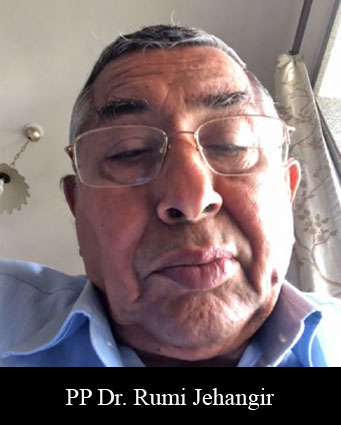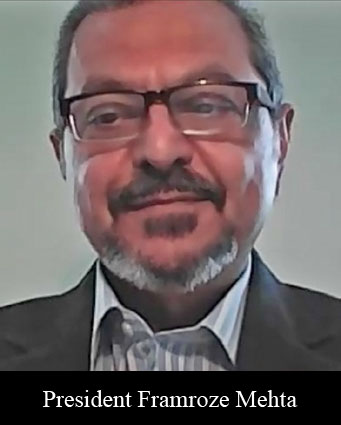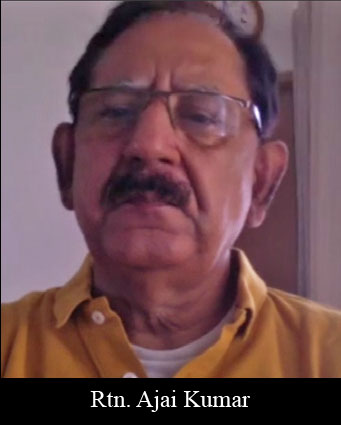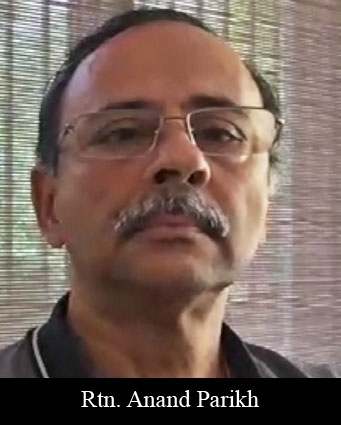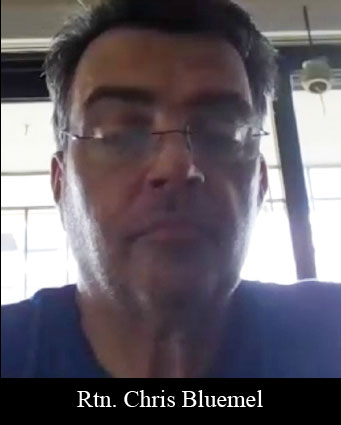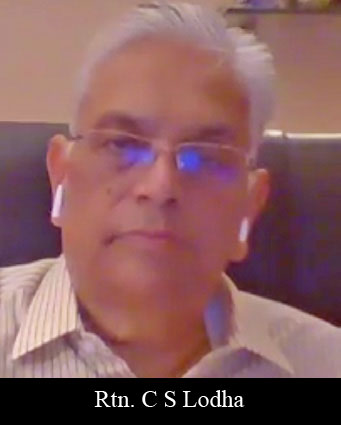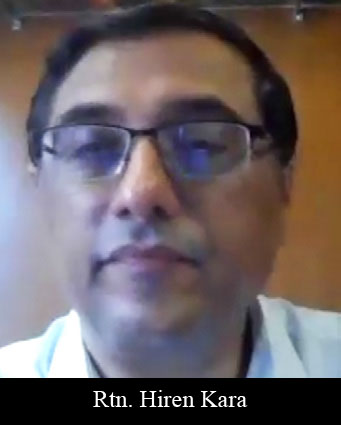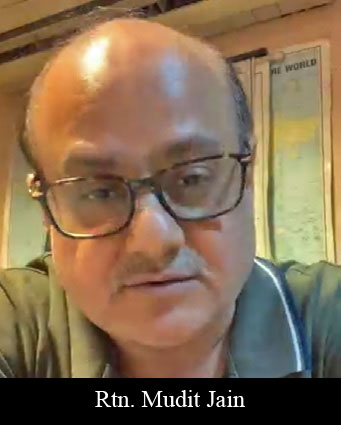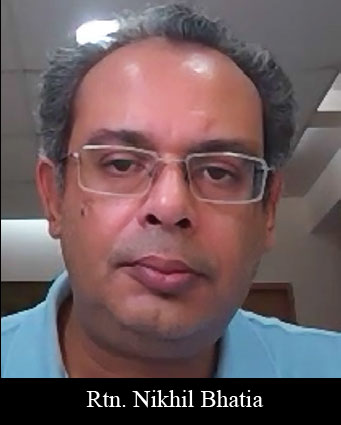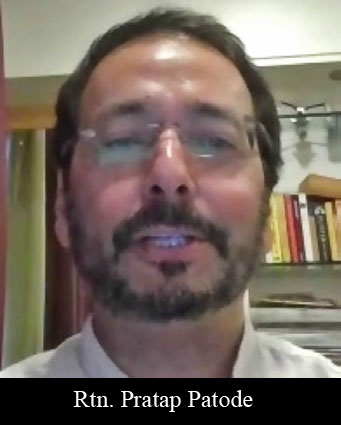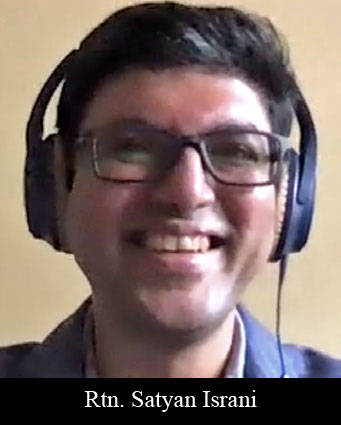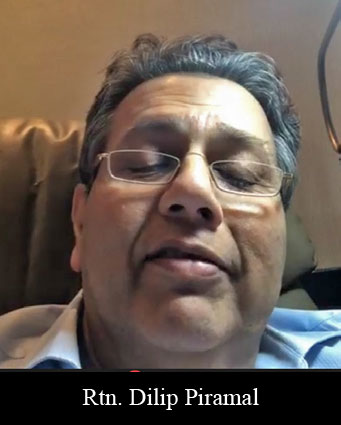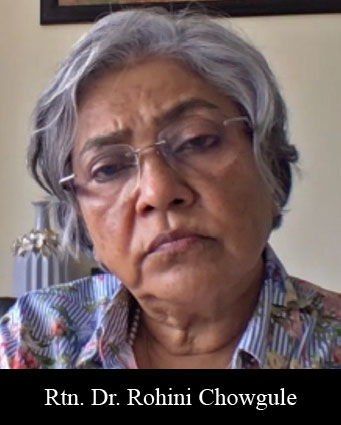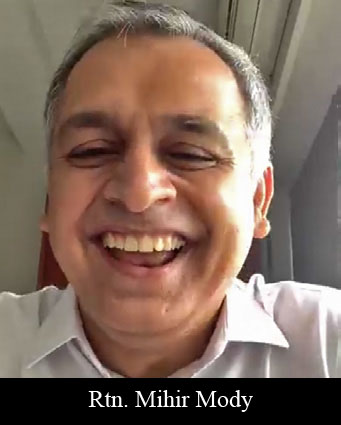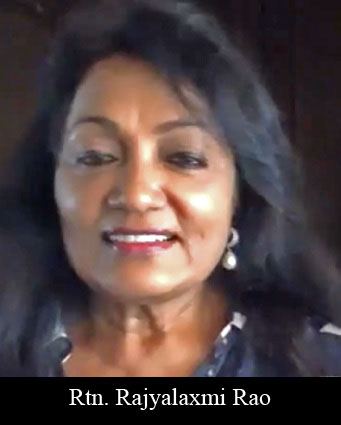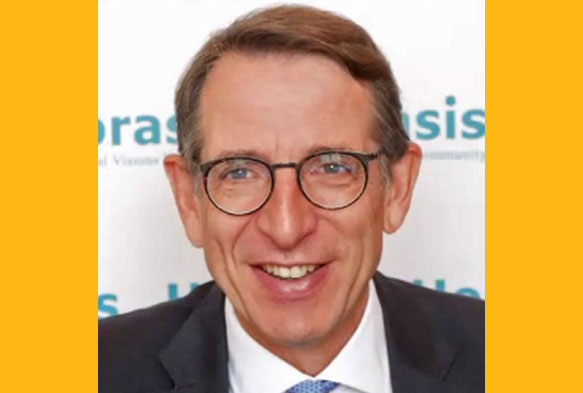
Dr. Frank Richter, Chairman, Horasis, Talks About Multi-Lateralism And Greater Stakeholder Investment In The World
LET ME BEGIN BY SAYING THAT THE CURRENT STATE OF THE WORLD IS QUITE GLOOMY; WE ARE EXPERIENCING A SECOND WAVE ALL AROUND THE WORLD, ESPECIALLY IN EUROPE. I HAVE TO SAY THINGS ARE NOT LOOKING GOOD.
In countries like Czech Republic and Belgium, the numbers of infected people are sky-rocking. It is the same in United States where there is a lot of controversy now, two weeks prior to elections. India, too, has experienced sky-rocketing numbers. The Indian Government tackled the first wave successfully: India was among the countries with the most severe lockdowns. But, of course, India is a large country, and it is difficult to contain the virus. Hopefully,
the vaccine will come in the markets sometime in the first quarter of next year and, hopefully, things will look
better.
It is not just the impact of Covid upon health but also on economy; most economies of the world are shrinking and economists are talking about the new global economic crisis much more severe than the crisis 10-15 years ago, the Lehman crisis. But maybe more similar to the crisis of the late 1920s and early 1930s when all the economies were shrinking and the trade imbalances appeared as countries closed borders, leading the world to disaster. So, I am quite pessimistic on the economy especially now as we are facing the second lockdown in most countries.
At the same time when we talk about the impact of Covid we have to think what is happening in terms of geo-politics and also conflicts within the society. We see that many conflicts around the world within societies to start with, for example what happened in Hong Kong and what is happening in Thailand now, people go to the streets and are not very happy with their government and it is of course a political claim but also an economic claim because many of the young people feel left behind and then go to the streets. It is mostly the conflict between the elites, those people who are governing our countries and the normal citizens.
This whole movement started two years ago, prior to the pandemic, with Yellow Vest Movement of France where hundreds of thousands of people went to the streets of Paris with a yellow vest and trying to make their voices heard to the government. They were saying, that we, the people need more support and we see so many imbalances between the elites and the normal citizens. This Yellow Vest Movement spilled over to Chile and other countries in Latin America and started a new global revolution because all the conflicts are linked by social media.
About conflicts between nations, we have seen more conflicts happening in Syria, Libya and more recently conflict between Armenia and Azerbaijan, and it looks like the world is out of order. People blame each other: it is always the other countries and that is what is happening. But global co-ordination is missing, where the world can come back to peace and mutual understanding. The most severe conflict I see is between the US and China and I believe that there is a new cold war in the making and there is so, much finger pointing, and a lot of Machiavellian mindset between both countries and there is no level playing field anymore.
It started with a trade conflict around two years ago – America proclaimed that all exports from China to the US were subsidized, destroying American shops but it is much more than a trade conflict. It is a conflict of technology, some of the large Chinese tech companies like Huawei, Lenovo, Tencent and others are competing with Apple, Amazon and Google and the question is which company is taking the lead in terms of technological advances.
This cold war, from a trade war to a technological war, might become an actual conflict in the South-China sea. So, that is the most serious conflict I see. If you see where US and China are moving, the power of US is waning, and US has less and less to say in the world. This is because when President Trump came to power, he cancelled many trade arrangements in Asia and Europe. There is actually an ongoing trade conflict between Europe and US.
At the same time, China is rising and of course China’s new economic figures actually look quite good. It is quite surprising how fast the country recovered. But even beyond the numbers and economic power, China is holding more and more political power in Asia. More and more countries are going along with China, China is embarking on the so, called new Silk Route going through Central Asia to Europe and many European countries are signing up on this new Silk Route including Italy, Greece and others and countries in the Balkan regions. So, China is using soft power and step by step increasing its standing in the world. I think it is a dangerous situation where one country is moving up and one country is moving down – this might lead to conflict in the future. I just hope that both the countries can find a level playing field and a new way to collaborate.
We, at Horasis, are very neutral, we are not saying anything against any country, we are just observing and like Rotarians we want to see peace in the making and the avoidance of conflict. India is here to play an important role. Of course, you have your own conflict with China at the border but beyond that there are trade relations between these two countries and in the long term all nations have to come together.
So, to analyse, I see two major trends in the world. One trend is leading us to populism, nationalism and chauvinism. It is a kind of talk-the-talk mentality where countries fight against each other, different groups of people within countries fight against each other. Young people against old people, people with power against the less power and this is very worrisome, this kind of a new Machiavellian mindset where the end justifies the means.
The European countries have seen populist parties on the rise, in Italy or France, all over. In some countries they are in the government, like in Hungary and these populist parties are interpreting democracies in a new way. So, that may be a negative trend but I also see the positive trend: the pandemics could actually be a chance to lead to multi-lateralism and to more understanding and co-ordination. This second trend, the trend of multi-lateral thinking is hopefully the trend that will prevail in the long term. We, at Horasis, support multilateralism, we want to bring different groups together in multi-stakeholder approaches as I mentioned before where everybody can join and exchange dialogue.
We have to also move to action from the dialogue. Maybe the old institutions of the past have lost the power and private organisations are new ways of collaboration. Of course, it is not just the Horasis, there are many others which are doing it but the more the better. We need this multi-stakeholder approach which is very much based on altruism. Altruism means that you don’t expect a direct return on what you give and what you do but in the long term, maybe something comes back because the whole environment is getting stronger and you, as a country, as a government will get a long-term advantage and if everybody would follow the concept of altruism, the world would be a much better place to live in.
New governance or new frameworks of governance is the topic of this talk. I am a fan of the United Nations and it is celebrating its 75th anniversary. The UN should be strengthened and not weakened. Some countries are cutting payment to the UN like the USA but we need strong institutions like the UN but also the World Trade Organization which is becoming less and less visible and fewer countries are respecting its judgements. So, strengthening the UN but also the organisations like the G20, India is a very important member of the G20 and it should actually replace the club of G7 and G8 because that is something of the past, of the industrialised countries of the 50s-80s. India is very much a leader in G20 and it is an organization which all support and also see how the G20 can work with the private sector.
India has a good government, PM Modi is well respected in the world, he is trying to mitigate the risk of conflict, he is engaging his government – he is very visible on the multilateral scene of the UN and that is the way to go. On the economy, India’s economy like others has been impacted. I believe India, in the long term, can be the new global engine of economic growth with luck like China or even better than China. Maybe five years from now, India will overtake China when it comes to exports. Of course, India’s main advantage is the system of democracy and China is more top down while India is bottom up. Currently, processes in India take longer. The Chinese just decide and do it, while in India it takes longer, but in the long term, it is a main advantage for India. The democracy and exchange also have a very strong stake.
What foreigners usually forget is that India is not just New Delhi but India is a continent of very strong states run by their own local governments who have developed their own local constituencies. So, I am very optimistic for India. But maybe what India could do is ease FDI to have more investors and I think that is part of the government’s policies but it needs to be more in practice. There are still hurdles for companies to come in. India is taking leaps forward in digitization and over taking maybe one step of development and whole digital process is so, important for India. When the demonetization happened, there was a lot of debate whether it was right or wrong – it was definitely shock therapy but in the long term, it was the right thing to do even so there was a cost to pay on GDP growth on the short-term. In the long term, digital is the way to go, there is no way back and Covid is accelerating digitalization.
I am a fan of the United Nations and it is celebrating its 75th anniversary. The UN should be strengthened and not weakened. Some countries are cutting payment to the UN like the USA but we need strong institutions.
So, India is on the right run. It is a stable government. And trying to engage with your neighbours in the SAARC regions, Nepal, Bangladesh, Sri Lanka and Maldives, SAARC and other regional organizations should be strengthened. SAARC could do much more – think about what ASEAN is doing, enabling Asia about also the EU. India is the largest country in SAARC, and it should play the leading role in uniting the whole South Asian continent.
We talked about global issues, conflict and new ways of governance, but what does it all mean for businesses? It is not a blessing in disguise, of course, but I believe Covid is a chance to reflect on capitalism and how we should shape capitalism in the future. Capitalism is focussed on very short-term results. Companies are listed and they reduce the workforce and the prices of their shares goes up. This is a paradox, a short-term oriented result.
I believe we have to move to the stake-holder value where companies deal with the whole social environment – with employees, and clients, but also society at large. Also, CEOs should be a bit like statesmen who deal with global issues because more companies are being impacted by what is happening globally. So, you can’t just operate locally where you are and export but you have to see what is happening in the world and adjust your strategies, maybe go into outsourcing and I think CEOs have to be very vigilant. I see CEOs as global citizens who deal with global issues. So, that is my view on capitalism built around purpose. I think all companies needs a purpose to say that we have to deal with society, be good citizens, work for public good and purpose is so, important. It should be in your DNA, not just an add-on like CSR, it should be built in all your services, products and corporate culture and when you do that, companies will be extremely successful. All the countries should move to eco-friendly approaches and aim to be carbon-neutral in the next 15-20 years.
So, that is what I would like to call a new social contract where the business sector is a very important part of it and companies always have a big picture in mind and try to make positive contribution. I would like to conclude by saying that the current state of the world might look gloomy when you check out the news, but I think we should be optimistic and believe that technology can help us all. There is AI, block-chain digitalization, and while a lot of people will lose jobs in Covid, but a lot of them will get new jobs, we need highly trained people in the area of IT and digital services. India is very well placed with its very vibrant IT industry in Mumbai, Bangalore and so, on. So, the future is bright.
ROTARIANS ASK
So, if multilateralism is practiced within countries, institutions like UN and WTO will be much stronger otherwise they are just another platform for leaders to strong-arm others and which don’t necessarily reflect of the citizens. Your comments please!
I understand your concerns and the concerns are shared with lot of people who feel that the international organizations and government are very abstract and that has no link to the citizens. I met many members of the UN and I strongly believe that they are good leaders. They are not elected by the people, it is not democratic but what the UN does is to pick the best people. A lot of issues cannot be solved by one nation alone. Climate change or water shortage for example, we need global collaboration and the way to do it is to trust international organisations. They should be controlled and liable for what they do. And if not, they should be replaced by different leaders or organisations. We do need reforms in the UN, for example we do need to give India a permanent seat in the Security Council because it’s not the reality any more where you have the old countries like France and England but not India. But finally it is a family of countries working together and not just the Security Council. The WHO is equally important and without them the pandemic would be chaotic and there would be no coordination. So, yes, I believe in this increased level of multi-lateral thinking.
What are your thoughts on China’s domination of Africa? The kind of investment they have made in Africa across countries, how do you see this business and luring of African leaders?
You are right about the influence of China in Africa in investment and influence, it is rising. I have travelled to around 75 African countries and whenever I go to the club floor of the hotel, I meet mostly the Chinese. There are no Americans or Europeans, maybe a few Indians, but the Chinese are everywhere. Is it good or bad? On the one hand, it is good that Africa is getting investment, many Africans nations want to do business. The Chinese discovered this early on while others neglected Africa. So, I would not say it is China’s fault that others are not there but the others should come more strongly to play on a level field with Chinese. I wouldn’t say it will be a Chinese colony, but of course they will have more power and presence in Africa, and China is a resource-hungry country.
It is interesting to note that about 20 years back, China started to send its prisoners to Africa and these Chinese then started their small shops and that is where they held a foothold. At the end of the day, everybody should get to Africa. Africa is strong and if they put their governance issue together, Africa will be shining.
In terms of belt road initiative, BRI is not progressing much, India has been opposing since the beginning. So, your comments on that. Also, you talk of UN, don’t you think a new UN will be better than repackaging UN because the UN has France and UK which are the powers of the past.
So, as I mentioned, we have to reform UN and get India permanent seats and unite France and UK into a European seat, just one seat for whole of Europe, but there should be some global pressure on those countries and get India in and also African powers – South Africa and may be Nigeria. But no, we should not replace UN, we have taken years and years and the question is where will it lead? We have to compliment UN with regional organizations we have EU, SAARC, ASEAN, NAFTA. We have to strengthen the global international system.
On India, I agree that India’s growth potential is much higher than what we see right now. India should be in double digits; the question is really why not? Reasons: FDI, Indian companies should be more export oriented, it is strong in many services but not in trading in terms of export. So, that is what is needed to put subsidiaries all around the world. So, it is inward outward approach, accepting FDI and also exporting to the outside.
Your comments on India-China hostility. There has been some pushback in a few countries on the BRI especially due to high-interest rate and that the future generation will have a high debt and repayment obligation and there has been a lot of animosity. How do you think the BRI situation will play out?
Yes, when the initiative was announced, there was a lot of hope that China can develop countries along the old silk route but many investments are behind expectations, especially from Central Asia. Interest rates are high. Pakistan is not able to pay back to China as a result of which for Pakistan it is going to be a huge dependency on China. At the end of the day, some investments are better than no investments. But we have to work on governance and also on the transparency in China. There are more and more conflicts in African countries when it comes to security and working conditions, there is a scope to improve. Sometimes Chinese put their people in Africa to work but what will be good is to employ local people on the ground.
About India-China hostility, it is always up and down and now it is up again, I really hope that the two leaders meet and find an agreement and there should be a line drawn on both sides avoiding any kind of war and because these kind of hostilities come every 5-10 years so, that is what PM Modi is taking the right steps being in discussion with China and I think that is the way to go. They should work together in the long term and not fight.
Do you think strategically Germany can be a good alliance partner as far India’s aspiration of being a manufacture hub is concerned?
Germany has actually a quiet and active approach and friendship with India. Manufacturing is happening and India should be a main partner in manufacturing. Traditionally UK should be the alliance partner but friendship with Germany should be improved.

